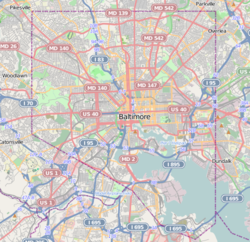Better Waverly, Baltimore
| Better Waverly | |
|---|---|
| neighborhood statistical area | |
| Coordinates: 39°19′43″N 76°36′11″W / 39.3284955°N 76.602951°WCoordinates: 39°19′43″N 76°36′11″W / 39.3284955°N 76.602951°W | |
| Country | United States |
| State | Maryland |
| City | Baltimore |
| Area | |
| • Total | .207 sq mi (0.54 km2) |
| • Land | .207 sq mi (0.54 km2) |
| Population (2015) | |
| • Total | 2,301 |
| • Density | 11,000/sq mi (4,300/km2) |
| Time zone | Eastern (UTC-5) |
| • Summer (DST) | EDT (UTC-4) |
| ZIP code | 21218 |
| Area code | 410, 443, and 667 |
Better Waverly is a neighborhood in the North District of Baltimore, located between the neighborhoods of Charles Village (west) and Coldstream-Homestead-Montebello (east). Its boundaries are marked by East 33rd Street (north), Exeter Hall Avenue (south), Greenmount Avenue (west) and Loch Raven Road (east).
The neighborhoods of Better Waverly (south of 33rd Street) and Waverly (north of 33rd Street, also known as Waverly-north) take their names from the Sir Walter Scott's first novel, Waverly.Better is from the adverb "better", meaning greater or larger.
Baltimore's former Memorial Stadium was originally located on the opposite side of East 33rd Street from Better Waverly, until the structure was demolished on February 15, 2002. At Mile 22, also known as the "Eddie Murray Mile", the Baltimore Marathon passes through Better Waverly.
As of 2015, there were 2,301 people and 924 households, and 3,873 families residing in the neighborhood. There were 863 housing units, with approximately 40% owner-occupied and 60% renter-occupied. The racial makeup of the neighborhood was 75% Black or African American, 20% White, 2% Asian, 1% Native American, and 2% from two or more races.
The median income for a household north of Montpelier Street was $40,250 and $30,855 south of Montpelier Street. Approximately 10% of residents have a bachelor's degree or higher. 25 percent of residents reported receiving public assistance income in the last 12 months.
...
Wikipedia

